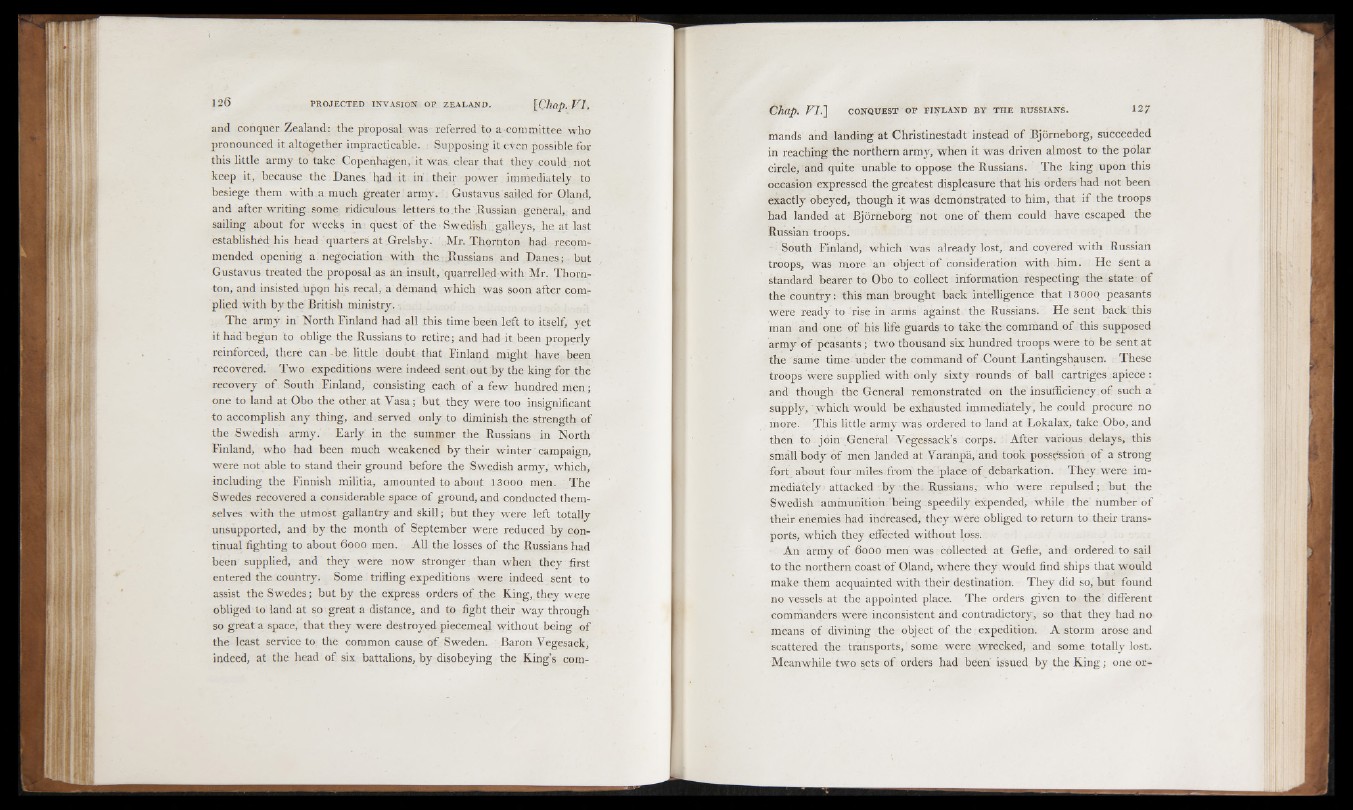
and conquer Zealand: the proposal was referred to a committee who
pronounced it altogether impracticable. : Supposing it even possible for
this little army to take Copenhagen, it was cléar that they could not
keep it, because the Danes, had it in their power immediately to
besiege them with a much greater ' army. Gustavus sailed for Oland,
and after writing , some ridiculous letters to .the Russian general, and
sailing about for weeks in; quest of the. Swédis.h;; galleys-, he at last
established his head quarters at Grelsby. JJr. Thornton had recommended
opening a négociation with the-Russians and Danes; but
Gustavus treated the proposal as an insult, quarrelled with Mr. Thornton,
and insisted upqn his recal, a demand which was soon after complied
with by the British ministry . ,
The army in North Finland had all this time been left to itself, yet
it had begun to oblige the Russians to retire; and had it been properly
reinforced, there can -be little doubt that Finland might have been
recovered. Two expeditions were indeed sent; out by the king for the
recovery o f South Finland, consisting each o f a few hundred men;
one to land at Obo the other at Vasa ; but. they were too insignificant
to accomplish any thing, and served only to diminish the strength of
the Swedish army. Early in the summer the Russians in North
Finland, who had been much weakened by their winter campaign,
were not able to stand their ground before the Swedish army/ which,
including the Finnish militia, amounted to about 13000 men. The
Swedes recovered a considerable space of ground, and conducted themselves
with the utmost gallantry and skill; but they were left totally
unsupported, and by the month of September were reduced by continual
fighting to about 6000 men. All the losses of the Russians had
been supplied, and they were now stronger than when they first
entered the country. Some trifling expeditions were indeed sent to
assist the Swedes; but by the express orders of the King, they were
obliged to land at so great a distance, and to fight their way through
so great a space, that they were destroyed piecemeal without being of
the least service to the common cause of Sweden. Baron Vegesack,
indeed, at the head of six battalions, by disobeying the King’s commands
and landing at Christinestadt instead of Bjorneborg, succeeded
in reaching the northern army, when it was driven almost to the polar
circle, and quite unable to oppose the Russians. The king upon this
occasion expressed the greatest displeasure that his orders had not been
exactly obeyed, though it was demonstrated to him, that i f the troops
had landed at Bjorneborg not one of them could have escaped the
Russian troops.
- South Finland, which was already lost, and covered with Russian
troops, was more an object o f consideration with him. He sent a
standard bearer to Obo to collect information respecting the state of
the country: this man brought back intelligence that 13000s peasants
were ready to rise in arms against the Russians. He sent back this
man and one of his life guards to take the command of this supposed
army of peasants; two thousand six hundred troops were to be sent at
the same time under the command of Count Lantingshausen. These
troops were supplied with only sixty rounds of ball cartriges :apiece :
and though the General remonstrated on the insufficiency, of such a
supply, which would be exhausted immediately’, he could procure no
more. This little army was ordered to land at Lokalax, take Obo, and
then to join General Vegessack’s corps. After various delays, this
small body of men landed at Varanpa, and took possession o f a strong
fort about four miles.from thelplace of debarkation. They were immediately;
attacked by the. Russians/, who were repulsed; but the
Swedish ammunition 'being speedily expended, while the number of
their enemies had increased, they were obliged to return to their transports,
which they effected without loss.
An army of 6000 men was collected at Gefle, and ordered to sail
to the northern coast of Oland, where they would find ships that would
make them acquainted with their destination. They did so, but found
no vessels at the appointed place. The orders given to the' different
commanders were inconsistent and contradictory, so that they had no
means of divining the object of the expedition. A storm arose and
scattered the transports, some were wrecked, and some totally lost.
Meanwhile two sets of orders had been issued by the K in g ; one or